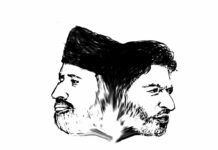Dr. Bashir A Dabla
The idea that, for much of the recorded history, ‘the few have ruled the many’ was introduced by two Italian sociologists, Vilfredo Pareto and Gaetano Mosca, with the latter further elaborating as to how the better organizational skills of the rulers empowered them to politically dominate the ruled. Pareto named these rulers as “the elite”. Later on, C. Wright Mills developed the concept of “the power elite” semantically equivalent to the concept of “ruling class”. In the US, he referred to the businessmen, government and military leaders as “American ruling elite”
Like elites in other countries, and India too, political elite in Kashmir [in its elementary form] dominated the political and other domains of life throughout post-1947 period. The nature of accession of J&K state to the union of India sanctioned the political elite here the necessary, legal and legitimate role in politics. During this period, the political [power] elite in Kashmir usually comprised of major-minor political leaders of all political parties, big business families, professionals-technocrats and bureaucrats-administrators, many of whom were borrowed from New Delhi.
The dominant, though unethical and unprincipled, role of the political elite in Kashmir during the entire post-independence era needs to be explained, in a situation which was characterized by political uncertainty, instability and alienation. The logical implication of this was the emergence of a dependent political elite which masqueraded in safeguarding the superior objective of national integration. In actuality, its members developed a dubious lifestyle in which they exploited all parties involved in the Kashmir problem for their self, family and group interests. In this way, the political elite in Kashmir were established in an organized form. In that political environment, all political leaders and actors, irrespective of their differences in politics, ideology, region and religion, played with the political aspirations of the masses and enjoyed all material benefits showered upon them by New Delhi rulers.
These propositions were confirmed by recently revealed Wikileaks reports related to Kashmir, India and Pakistan. These reports even though, called as partisan and particularistic by some, however, explicitly reflect the complex and dubious role of political elite in Kashmir. From intentions, objectives, performance, perspective, ideology, relationship, to visa begging, and so on, the documents divulge everything in the confused scenario of Kashmir conflict. The entire political elite have been dubbed as internally “polluted” with a clean fa?ade more like Dal waters.
In reality, these are the facts of political life in Kashmir. The entire political elite comprising of individuals, families and groups, irrespective of their differences, have consciously and systematically followed their respective economic interests at the cost of common masses. It applies to all, left, right and centre. The so called nationalists as well as separatists have followed qualitatively the same political ethics and culture. All these political representatives have accumulated huge wealth through dubious means, which can last for many of their future generations.
Two basic propositions follow from the above. One, the so called nationalists and their political parties did not work sincerely and realistically for national integration and national cohesion, their main objective being to maintain the rapport with Delhi only. Two, the so called separatists and their political outfits did not work seriously and sincerely for the cause of political independence of Kashmiri. They thrive on debasing the exogenous opposite political forces. They still fail to establish a united political platform for presenting the Kashmir problem reasonably and cohesively. Their chronic disunity tells their real story.















